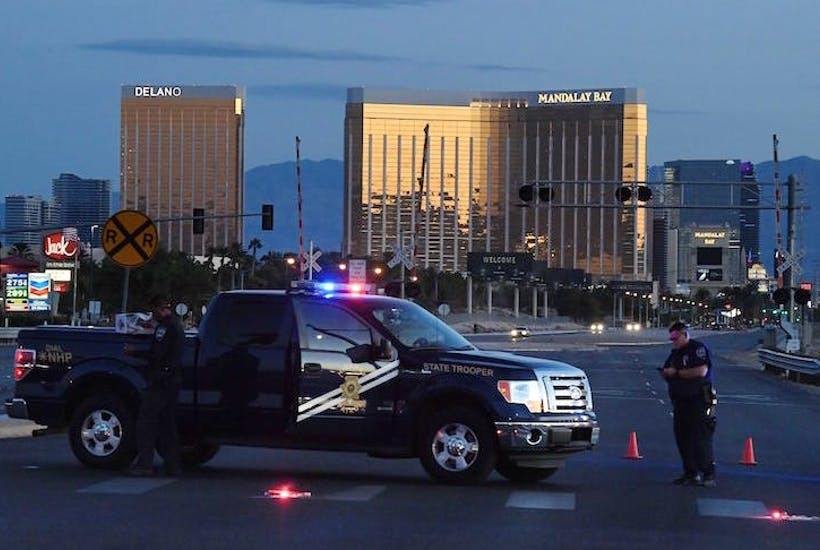There’s a scene in the touching Richard Linklater film Boyhood where the young Mason goes to visit the rural family of his estranged father and is given a Bible and shotgun for the first time. I felt a niggling terror watching it, remembering Chekhov’s maxim, that the film would end with the boy taking the gun to himself, or his family, or his school classmates.
It’s understandable why the audience might fear the worst, seeing as America’s spree-killing epidemic seems to has no end in sight, with a new low reached on Sunday in Las Vegas.
Why doesn’t America just ban the damn things, people ask, or at least make them far harder to access, like in Japan for instance, where there are just six gun murders a year?
Certainly there are plenty of arguments for restricting guns, illustrated here and here.
However the problem with the statistics on gun violence, as Scott Alexander has explained, is that gun death figures do not always distinguish between homicide and suicide. There is a clear, unquestionable link between gun availability and suicide – which some might argue is good enough reason to ban them – but state-by-state comparisons do not always show a link between homicide and gun ownership. In Wyoming some 59.7 per cent of homes have a gun but its murder rate of 1.4 per 100,000 is the same as Canada’s, and only one-third of the US rate as a whole.
Largely this is because rural states tend to have more guns, and to be more peaceful – and also more white. Traditionally America’s love of firearms is associated with a fear of black-on-white violence, which if you’re a sophisticated European who’s watched Bowling for Columbine you’ll know is all down to historical racism and the media. Plus, of course the fact that African-Americans have a homicide rate eight times that of white Americans, which skews all comparisons between the US and Europe. In fact – as Scott Alexander points out – even if you successfully took away all guns in America, its non-gun murder rate of 1.2/100,000 would still be higher than most of Europe (and that’s assuming gun-killers do not switch to knives, which many would).
There is not just the level of violent crime but the intensity; Americans have a not unreasonable fear of the sorts of violence that are almost unknown in Europe, including things like home invasions. It is not unreasonable, therefore, for a population in a violent society to wish to own guns – indeed the National Rifle Association advocated gun control for over a century, only changing its tune in the 1970s as America’s urban crime explosion entered its Death Wish era.
If you want to compare America to Europe, it is better to look at its white population, for which the relationship between gun ownership and homicide is not so clear. So according to this study:
‘There is a positive correlation for non-hispanic whites (r=0.45), but it pales in comparison to the racial/ethnic differences here. To put this into perspective, amongst non-hispanic whites (the bulk of the gun owners in most states), states with the highest gun ownership rates have just 1 death per 100,000 more than states with the lowest rates (on average).’
Although that’s not nothing, and white Americans are more violent than Europeans.
The most murderous state in Europe, Ukraine, would only be eighth in the US if only white Americans were included, while ten European countries score below the least homicidal white American state, New Hampshire, and the vast majority would feature among the bottom five.
Is this something to do with America having far more guns per capita?
Well, there are plenty of studies showing gun control reduces homicide. The Gun Control Act expansion, according to one paper, ‘led to 17 percent fewer gun-related homicides among female intimate partner victims and 31 percent fewer gun homicides among male domestic child victims. The law also has protective benefits for those that were not targeted by the legislation. “Other” family members (parents and siblings) also experience a 24 percent reduction in gun homicides.’
However overall the stronger studies are less sure of the relationship between gun control and reduced violence. (HT @anonmugwump for all these.)
Scott Alexander concludes that ‘if you adjust for all relevant confounders, there is a positive correlation between gun ownership and homicide rates (~90% confidence). This relationship is likely causal (~66% confidence)’ but ‘The majority of the difference between America’s murder rate and that of other First World countries is not because of easier access to guns in America (~90% confidence). But some of it is due to easier access to guns. This is probably about 0.5 murders/100K/year.’
Also, he adds: ‘An Australian-style gun control program that worked and had no side effects would probably prevent about 2,000 murders in the US. It would also prevent a much larger number of suicides.’
Britain and Australia have had no repeat of Dunblane or Port Arthur after tightening up their gun laws, which I’m very happy about. Even if such massacres were rare, I would personally consider that a worthwhile law, although this comes down to risk and how much we are prepared to accept; I’m an urban effete and my one experience of handling a gun was rather like Woody Allen in Bananas, so preventing people from having them seems like no great sacrifice even to reduce an already small chance of someone getting shot.
If I were American I would certainly support far stricter controls, but then I’m not American and there is little point in cherry-cheeked Englishmen in cravats lecturing the frightful colonials on how they should run their country. It’s just the way things are there.
Incidentally young Mason turns out just fine; he goes off to college, gets a girlfriend, and never shoots anybody. Not all life is filled with horror.


















